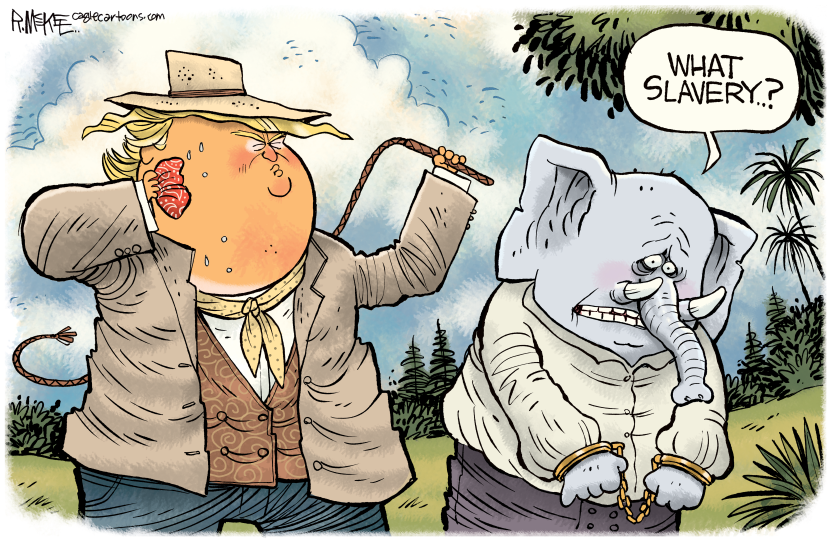
Subscribers Only Content
High resolution image downloads are available to subscribers only.
Not a subscriber? Try one of the following options:
OUR SERVICES PAY-PER-USE LICENSINGFREE TRIAL
Get A Free 30 Day Trial.
No Obligation. No Automatic Rebilling. No Risk.
For almost a decade, Donald Trump has sent the Republican Party and much of the mainstream media into a political whirlwind. Trump’s bombastic behavior and searing personal attacks have angered many establishment Republicans while endearing him to hard-line conservatives.
But it’s nothing new for the Grand Old Party.
Over the past half-century, Republicans has engaged in behavior that has allowed individuals like Trump to rise and flourish in its ranks. Much of it can be traced back to the 1964 Republican National Convention in San Francisco, where the radical right elements of the party successfully wrestled power away from the more centrist Rockefeller wing, which they snidely referred to as a group comprising “weak sissified men.”
At this same convention, the more racist delegates verbally and, in some cases, physically attacked some of the few Black and other non-white delegates, including baseball legend Jackie Robinson. It was also in 1964 that Congress ratified the landmark Civil Rights Act.
Approval of this monumental piece of legislation caused such vehement dissension and outrage among so many conservatives (among them was Dixiecrat leader Strom Thurmond, who secretly fathered a Black child with his family’s maid) they denounced the Democratic Party and became Republicans. Thus, in the minds of many GOP men, genuine red-blooded men were hard-core segregationists.
Capitalizing on those sentiments, the GOP apparatus, led by its 1968 nominee Richard Nixon, employed the infamous Southern strategy. A number of southern governors of the era, notably Alabama Gov. George Wallace, employed this strategy (along with the slogan “law and order”) in their campaigns to appeal to white southern Democrats who were growing ever resentful at what they saw as America’s growing diversification and radicalization. This was a message that played on the racial resentments of whites while promoting segregationist themes.
With Nixon successfully winning the presidency in 1968, this sort of political dog whistle politics among Republican operatives was the standard for more than two decades.
General dissatisfaction with Jimmy Carter’s performance, coupled with international crises, allowed this form of resentment politics to return in the early 1980s. Indeed, Ronald Reagan’s 1980 presidential campaign started off in Philadelphia, Miss., advocating for states’ rights. It’s the same city where the White Knights of the Ku Klux Klan murdered three civil rights activists in July 1964: 25-year-old Michael Schwerner, 20-year-old Andrew Goodman (both white and Jewish), and 19-year-old James Chaney. Their killers justified the murders as crucial in preserving their way of life and protecting white women from supposed “communists and outside agitators.”
Understandably, the optics of Reagan’s move sent shock waves through liberal political circles at the time. This was the same campaign that would refer to “welfare queens” riding around in pink Cadillacs and sexually objectifying Black men by referring to “Big Black Bucks” using food stamps to purchase T-bone steaks. Radical leftists and “militant feminists” were also targets of their cowboy diplomacy campaign and conservative message. This strategy managed to secure Reagan two terms as president.
This would continue in 1988 when the George H.W. Bush campaign “Hortonized” Democratic Party nominee Michael Dukakis by running an ad depicting the story of a Massachusetts prisoner, Willie Horton, who had murdered a young White couple while out on a weekend furlough. This message was designed to play on the fears of conservative whites, who harbored unhinged fears of Black men.
In 1992, the GOP bought out its best and brightest extreme elements at its party convention in Houston, Texas. From 700 Club host Pat Robertson arguing that feminism encouraged women to refuse to bake cookies to eventual presidential candidate Patrick Buchanan declaring America was in the midst of a cultural war, it looked as if party lunatics had taken over the convention asylum. Many political pundits argued that such a spectacle was the reason William Jefferson Clinton and the Democratic Party captured the White House for the first time since 1976.
It remains to be seen how the 2024 election will turn out. However, one thing is for certain: Trump’s rabid, unrestrained behavior is nothing new for the GOP. He embodies the spirit, values, and message that have defined a sizable segment of the Republican Party for more than half a century.
–
Copyright 2024 Elwood Watson, distributed by Cagle Cartoons newspaper syndicate
Elwood Watson is a professor of history, Black studies, and gender and sexuality studies at East Tennessee State University. He is also an author and public speaker.